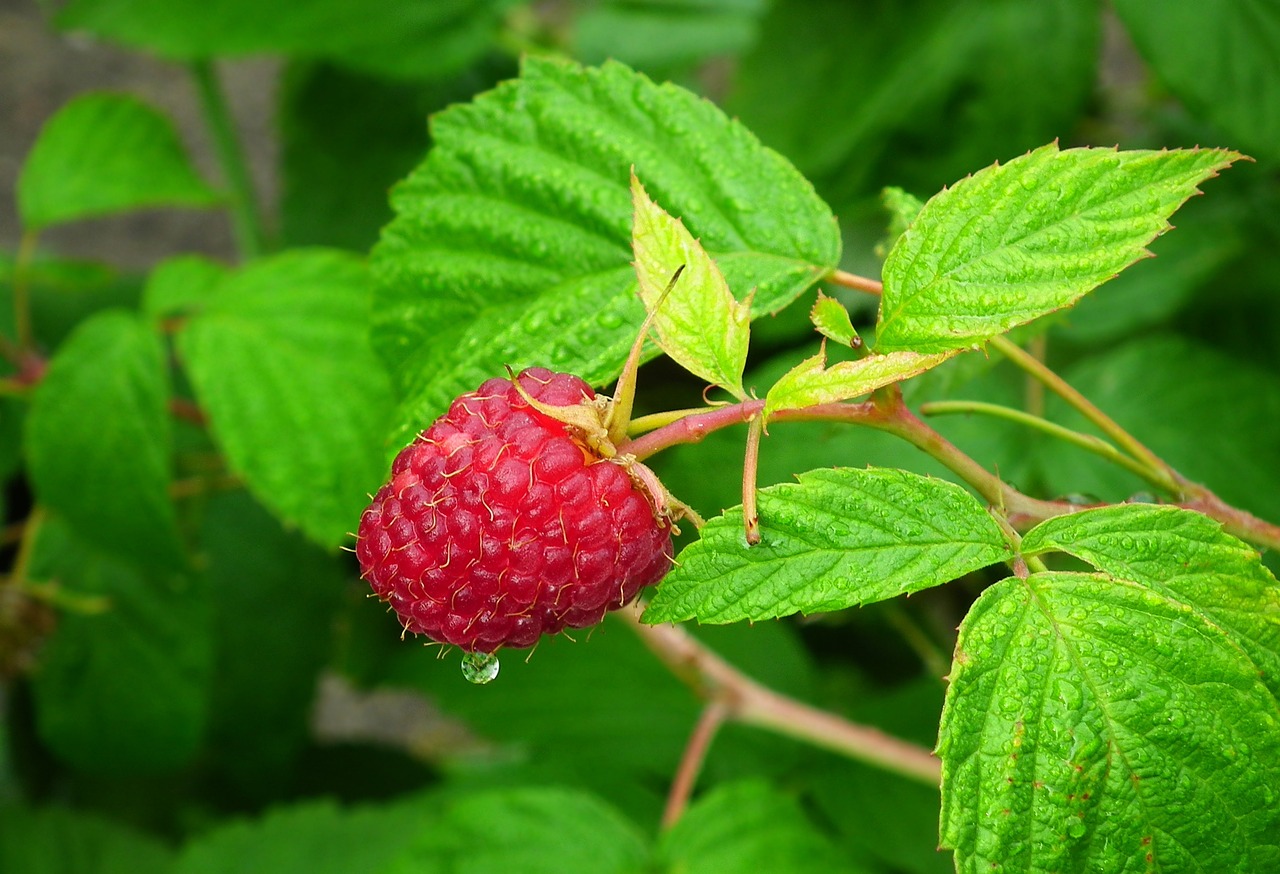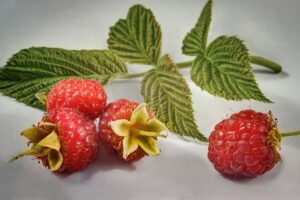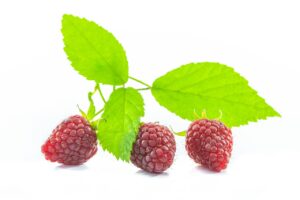Red Raspberry leaves
Overview
The red raspberry plant, known as Rubus idaeus, is more than just a fruit-bearer. Its leaves have been traditionally used for health, particularly in women’s wellness. Rich in compounds like flavonoids and tannins, these leaves offer potential antioxidant and anti-inflammatory benefits. Wide-ranging traditional uses hint at soothing effects on the gastrointestinal and uterine muscles, although their impact when smoked is less understood. Always consider moderation and professional guidance to ensure safe consumption.
Common name(s): Red raspberry, European raspberry, American raspberry, wild raspberry
Scientific name: Rubus idaeus

Characteristics
Known for their potential medicinal properties, particularly in women’s health, and containing active compounds such as flavonoids, tannins, and ellagic acid.
Region
Native to Europe and northern Asia, extensively cultivated in temperate regions worldwide.
Natural Habitat
Found in temperate forest clearings, edges, and fields.
Cultivation
Prefers full sun, well-drained, fertile soil; consistent moisture without waterlogging.
Traditional Usage
Red raspberry leaves have been revered for their potential support in women’s health, offering a natural option for addressing various conditions. Here’s a brief look at the traditional uses of these leaves:
- Easing menstrual discomfort, assisting in reducing the pain and cramping associated with periods.
- Aiding in childbirth, as they are believed to help strengthen uterine muscles, which could be beneficial during labor.
- When brewed as tea, these leaves are thought to provide a soothing effect on the gastrointestinal tract, which can help alleviate issues like diarrhea or intestinal inflammation.
- Used as a mouth rinse, they may help to relieve sore throats and oral irritation due to their anti-inflammatory properties.
It’s essential to acknowledge the current gaps in scientific research regarding these uses, and anyone considering them should consult with a healthcare provider for personalized advice1.
Historical Usage
Used medicinally in ancient Greek, Roman, and medieval times, particularly for women’s health.
Common Usage
Commonly used for women’s health, soothing gastrointestinal discomfort, and as a herbal tea ingredient.
Effects
The consumption of red raspberry leaves can be traced back centuries, with a history rooted in traditional herbal practices. Loved for their natural benefits, these leaves contain a cocktail of compounds that engage the body in various positive ways.
- Soothing for the Digestive System: Red raspberry leaves are known to have a calming effect on the gastrointestinal tract, alleviating discomfort and aiding digestion.
- Uterine Muscle Support: They may provide relief for uterine muscles, making them a traditional go-to for menstrual-related concerns.
- Anti-inflammatory Properties: The leaves have anti-inflammatory qualities, which makes them potentially beneficial for reducing inflammation.
- Antioxidant Effects: Loaded with antioxidants, red raspberry leaves help in fighting oxidative stress within the body.
- Mouth and Throat Care: As a mouth rinse, they’re thought to help soothe sore throats and oral inflammation.
To experience the full spectrum of these effects, red raspberry leaves are often brewed into herbal teas or incorporated into various preparations. Keep in mind that while commonly safe in moderate amounts, it’s always wise to consult a healthcare provider for personalized guidance1.

Red raspberry leaves revered for centuries for their medicinal properties, particularly in women's health, with historical records from Europe to Asia documenting their role in easing menstrual discomfort and assisting childbirth.
Effects when smoking
When smoking red raspberry leaves, anecdotal evidence suggests a few potential effects, although these are not extensively documented by scientific research. Individuals who opt for this method of consumption might experience:
- Relaxing Qualities: A calming effect that may soothe the body and mind, similar to the traditional use of the leaves in teas.
- Flavor Experience: The mild astringency present in red raspberry leaf tea might translate into a subtle flavor when smoked.
- Mild Throat Soothing: As with traditional use for sore throat, some users might find mild relief when smoking the leaves.
Smoking any herb, including red raspberry leaves, involves inhalation of smoke, which could have potential respiratory effects. It’s necessary to approach this practice cautiously and consider the lack of in-depth studies regarding the smoking of red raspberry leaves. Consulting a healthcare provider before starting any new herbal regimen is advisable, especially to understand any personal health implications and potential interactions with other medications or treatments.
In the absence of firm scientific conclusions, those interested in smoking red raspberry leaves should start with small quantities and monitor their body’s response to determine personal suitability and tolerance. Safety should always be the priority, along with adherence to legal guidelines and personal health considerations.
Flavor Profile
Mildly astringent flavor similar to red raspberry berries.
Edible Parts
Fruit and leaves
Effects when Smoked
Effects when smoked are largely undocumented and not supported by scientific data.
User Experiences
Users often report feelings of calm, particularly for menstrual discomfort and gastrointestinal relief.
Medicinal Benefits
Red raspberry leaves have been traditionally valued for their medicinal qualities. While scientific research is still exploring the full range of benefits, these leaves are known for their content of active compounds such as flavonoids and tannins. Below are some of the potential medicinal benefits:
- Anti-inflammatory effects: May help reduce inflammation in the body.
- Antioxidant properties: Could protect cells from oxidative stress.
- Cardiovascular support: Might assist in maintaining heart health.
- Aid for the digestive system: Can have a soothing impact on the gastrointestinal tract.
- Women’s health: Traditionally used for easing menstrual discomfort and supporting childbirth.
These uses mark red raspberry leaves as an intriguing option for those interested in natural health remedies. However, as with any herbal supplement, it’s wise to consult a healthcare provider for personalized medical advice, especially during pregnancy1.
History and Folklore
Red raspberry leaves have been utilized for their medicinal properties since ancient times. Cultures across Europe and Asia revered the leaves, especially for their contributions to women’s health. These historical uses include alleviating menstrual pain and aiding in childbirth. References to the medicinal value of red raspberry leaves can be found in ancient Greek, Roman, and medieval texts. The enduring usage throughout history highlights the leaves’ significance in traditional herbal medicine practices[1].

Red Raspberry Leaves: Traditional Wellness Ally for Women Beyond Fruit
Side Effects and Contraindications
While red raspberry leaves are often considered safe, they may cause side effects and have certain contraindications:
- Digestive disturbances: Overuse might lead to digestive issues such as nausea or loose stools.
- Effect on pregnant women: Due to their traditional use in pregnancy, it’s crucial for pregnant women to seek medical advice before use.
In some individuals, red raspberry leaves could provoke an allergic reaction. As with any herb, moderation is key to avoid potential adverse effects. Contraindications primarily concern those with pre-existing health conditions and pregnant women1. Always consult with a healthcare provider prior to starting any new herbal regimen.
Legal Status
Red raspberry leaves are completely legal and widely accessible for purchase at health food stores and through online vendors. They are not classified as a controlled substance, so you can buy and use red raspberry leaves without worrying about legal restrictions[1].
This open legal status makes red raspberry leaves an easy-to-obtain herb for those looking to explore their use in various forms, including traditional tea preparations.
References
1. Raspberry – Wikipedia, https://en.wikipedia.org/wiki/Raspberry
2. Rubus idaeus – Plant Finder – Missouri Botanical Garden, https://www.missouribotanicalgarden.org/PlantFinder/PlantFinderDetails.aspx?taxonid=295999
3. Rubus idaeus – US Forest Service, https://www.fs.usda.gov/database/feis/plants/shrub/rubida/all.html
Image Credit: PhotoMIX-Company
Image Credit: MrGajowy3
Image Credit: 6653167
Nicolas Duval
Nicolas is a passionate advocate for nature and the art of wildcrafting. His dedication shines through in Wildcraftia, a website he meticulously crafted to serve as a haven for nature enthusiasts worldwide. Driven by a deep appreciation for nature’s connection to humanity, Nicolas embarked on his journey in 2011 with SmokableHerbs, a platform showcasing his love for nature’s bounty. Building upon this foundation, he established Smokably, a thriving online store offering premium herbs and blends to a global audience.
